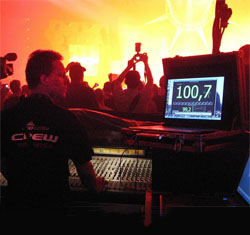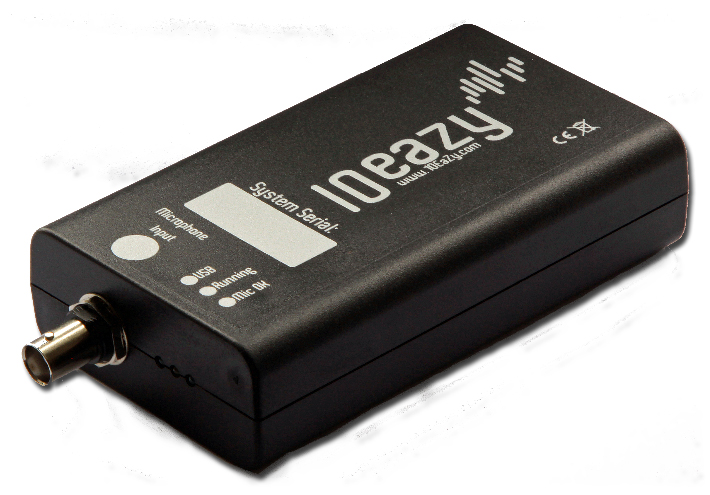
Right out of the box, installation is straightforward. A CD is provided that will work with Windows systems XP and above, and with just a few clicks, the software is installed. The software then prompted me to plug in the hardware, and the system was all set.
To begin measuring, I simply set a destination for the log file and gave it a name. If you have a known target Leq limit and time period for the session (for example, 103 dBA for 3 hours), you can enter this upon start up. The software is very intuitive and easy to use.
Within a few minutes I was confident that the system was working correctly and started to do some testing, comparing 10EaZy’s readings to my usual handheld SPL meters (a mid-priced professional measurement unit) as well as a few SPL apps on my iPhone.
Using a steady 1 kHz tone, I compared my trusty meter to the readings of 10EaZy, and was pleased to find that it was within .5 dB of the laptop display. My iPad apps didn’t fare as well. One was off by 1 dB, while another was off by about 2.5 dB (To be fair, that’s still pretty good for a free app using a built-in mic on a mobile phone).
Plentiful Features
Next, I used 10EaZy to help check out some new powered loudspeakers that were just shipped to our shop. I ran a variety of tones through my signal generator into a Mackie 1604VLZ4 mixer and then into the loudspeakers, checking to see if any unit varied widely from the others. Happily, all were in proper working order, so it was time to crank up the music and see what the loudspeakers, as well as 10EaZy, could do.
The display is very easy to read, large green letters against a black background. There are four buttons on the screen: Event Log allows you to add a time stamp with a simple click to the log; Running Order lets you add band names, playing times and duration to the log; History shows what’s been happening since the measurement session started, and it also allows you to change the plot and look to a variety of styles and colors; and finally, Full Screen toggles between normal and full screen views.
The MaM (Maximum Average Manager) is particularly interesting. This display shows you how much above or below you are from your target SPL over time, in 1 dB increments. What this means for a festival, for example, is that if one band engineer runs their entire set 4 dB above the target level, they effectively use up available loudness for the duration of the Leq. Other acts would have to run lower in level to even out the Leq and get back to your target level.
I took the system out to several gigs and basically used it the same way every time, setting up the mic and laptop at FOH and then using 10EaZy as a reference for the overall show volume. I found I could also run the program in the background and it would still log what was happening, and I could also run a music playback program at the same time. Nice.
The 10EaZy feature set is plentiful. Right now, with much of my present work focused on corporate shows/events, I’m rarely encountering (at least as of yet) the need for sophisticated SPL metering or logging, but for those working in the touring and festival sector (where they’ll be encountering increasing SPL restrictions), this is a great system to have in the toolbox. It’s also perfect for venues needing to comply with local noise ordinances.
The display is easy to read, and the logging will come in handy when a neighbor complains about the noise level. And because it’s a calibrated system, the data will stand up to governmental and organizational scrutiny.
U.S. MSRP: 10 EaZy Class 1 system—$2,793; Class 2 system—$2,360; RT system—$1,742; SW software dongle—$299; Class 1/RT system clamp & windscreen upgrade kit—$50.
For more information about 10EaZy, including in-depth descriptions of class compliance and the various 10EaZy systems, check out the U.S. 10EaZy website at 10eazy.us. And to purchase 10EaZy, go here.
To comment on this review and/or ask Craig questions, go to the PSW Road Test Forum.
Senior contributing editor Craig Leerman is the owner of Tech Works, a production company based in Las Vegas, and he’s also the moderator of the Road Test Forum here on PSW.


